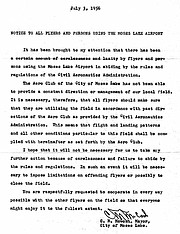Getting the word out was different in 1938
MOSES LAKE - September 19 was not the worst day of the crisis - far from it, actually - but it was a bad day. They were all bad days, that September 1938, as the Munich crisis pushed the world to the brink of war. So it's likely that the city fathers of Moses Lake, even as they signed the papers to incorporate the city that day, were checking their phones.
Or maybe they were looking for a laptop, any laptop, with a wifi connection that happened to be hanging around. Or maybe looking for a TV, trying to find out what was going on out there.
Well, not so much. Trouble had been coming all summer long and was going to get worse, although war didn't come until 1939. But the means to get the word out weren't very efficient by 2013 standards.
Most town dwellers, and definitely most businesses, had telephones, even in small towns like the newly renamed Moses Lake. The notion of a portable phone, let alone one that could connect to an international network, was the stuff of fantasy to the extent anyone imagined it at all.
When it was necessary to make a phone call, the caller rang up the manual exchange (or in most towns, the womanal exchange; most telephone operators were women) and waited to be connected. A long-distance call, on the rare occasions a caller tried to make a long-distance call, could take hours.
Most families owned a radio, wherever they lived, as long as they had electricity. (The power lines hadn't made it all the way out into the country yet.) Grant County residents tuned into KPQ, out of Wenatchee, and maybe KXLY or KSBN, out of Spokane. Really fancy radios, cutting edge tech stuff, had shortwave capability and listeners could hear what was happening in Europe right from London or Berlin.
Commercial radio didn't come to the Columbia River Basin until after World War II.
A few advanced tech types were experimenting with the idea of radio with pictures, an innovation they called television. There were even a few television broadcasts in big cities in 1939, but for most people it was all the stuff of the pulps, the science fiction magazines that sold for a dime.
News usually came in the newspaper. Moses Lake didn't have its own newspaper in 1938, and news came on the train, north from Wenatchee (the Wenatchee World), or west from Spokane, a multi-newspaper town in those days.
Word got around when it had to, of course - neighbors ran across the street to tell neighbors about the big hurricane that hit New England two days later, or the dramatic news of the end of the Munich crisis in early October. Sometimes that's the way news still gets around, even in a connected world.





